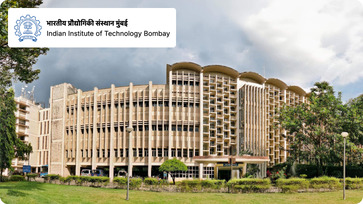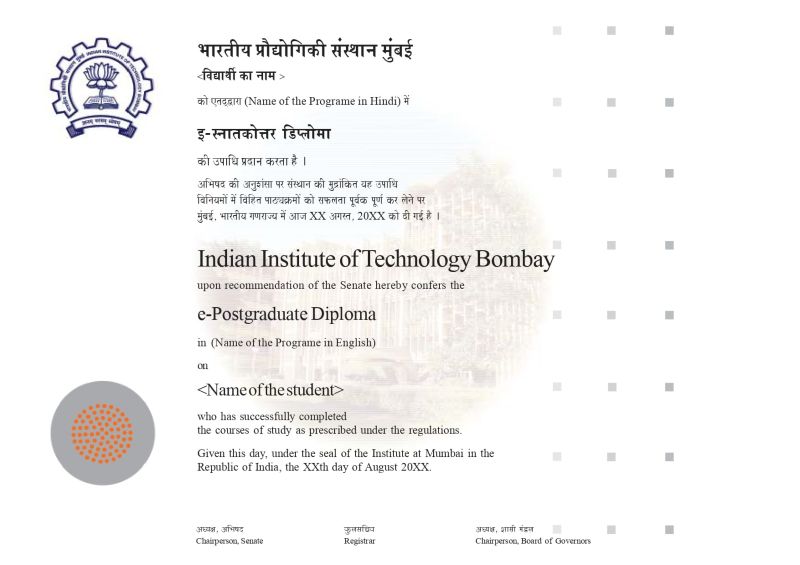
Download Brochure
Check out the program and fee details in our brochure
Thanks for your interest!
An advisor will be reaching out to you soon.
Not able to view the brochure?
View BrochureGet details on syllabus, projects, tools, and more

Designed and delivered by IIT Bombay CSE faculty
Earn IIT Bombay credits which can be saved in the Academic Bank of Credits (ABC)
Concept-based curriculum
In-person graduation ceremony at IIT Bombay campus
Weekly live sessions from IIT Bombay CSE faculty for learning and query resolution
IIT Bombay alumni status
Online 6-course curriculum designed for both working professionals and fresh graduates
Access to IIT Bombay’s Lateral Hiring Group
Meet CSE faculty and experience IIT Bombay campus during campus visit
Personalised assistance with a dedicated Programme Manager
Home to 47 faculty members and top achievers of the First 50 ranks (JEE Advanced) and First 100 ranks (GATE CS)
Faculty honoured with accolades such as the Padma Shri, Fellow of the ACM and IEEE, Bhatnagar Award, Infosys Prize and many others
100+ publications annually in top-tier conferences and journals, and sponsored research projects worth Rs. 50 crores
Winners of the President of India Gold Medal and Distinguished Alumni Awards, leading researchers, entrepreneurs and influential policymakers
This e-Postgraduate Diploma requires candidates to successfully complete 36 IIT Bombay credits from CSE through a mix of courses, each of which will be of 6 credits. 9 courses are confirmed during the inaugural ePGD. These courses will be organised in three course baskets as mentioned below:
A. Theory and Practice of Advanced Programming: The courses offered in this bucket are The Program Developer's Toolbox; Algorithms and Complexity; Web and Software Security.
B. Computing Systems: The courses offered in this bucket are Cryptography and Network Security; Database and Big Data System Internals; Introduction to Blockchains.
C. Artificial Intelligence and Machine Learning: The courses offered in this bucket are Foundational Mathematics for Data Science; Natural Language Processing and Generative AI; Foundations of Computer Vision.
This e-Postgraduate Diploma in Computer Science and Engineering requires candidates to complete 6 or more courses. Out of these, a candidate has to pass at least 1 course from each one of the above course baskets. The remaining courses can be from any basket. The details of the courses offered are:
Read more
A: Theory and Practice of Advanced Programming
The Program Developer's Toolbox
Description:
In this course, you will be introduced to essential tools and programming environments for software development. You will learn the Unix operating system, the C/C++ programming environment, and various software management tools. The course will cover the concepts behind Python programming, its popular libraries such as NumPy and SciPy, Web programming with HTML, CSS, and JavaScript, and elements of AI programming. To solidify your understanding, you will complete a course project that demonstrates your grasp of the key concepts covered in the course.
Topics:
Algorithms and Complexity
Description:
In this course, you will explore foundational concepts of algorithms and computational complexity. You will learn fundamental techniques for solving computational problems like induction, recursion, divide and conquer, dynamic programming and greedy algorithms. You will gain a strong understanding of complexity theory, by studying concepts of undecidability, polynomial-time problems, complexity classes, NP-hardness and NP-completeness.
Topics:
Web and Software Security
Description:
This course provides a comprehensive overview of web and software security, focusing on key
concepts such as web protocols, session management and server internals. You will explore
both server-side and client-side vulnerabilities, and also software and OS security, including the
fundamentals of Linux security. You will also learn the use of tools and frameworks like OWASP
Top 10 vulnerabilities, CVE database and CVSS scoring, integral to understanding and mitigating
cybersecurity risks.
Topics:
B: Computing Systems
Cryptography and Network Security
Description:
In this course, you will learn both cryptography and network security, starting with an overview of confidentiality, crypto-analysis, data integrity, and cryptographic protocols. You will explore various network attacks across different layers of the protocol stack, such as Eavesdropping, ARP spoofing and DHCP attacks. The course also covers secure network protocols, firewalls, and intrusion detection systems, providing you with the knowledge to secure and defend modern network infrastructures against potential threats.
Topics:
Database and Big Data System Internals
Description:
In this course, you will explore the internals of database systems, covering key concepts such as data storage, indexing, query processing, and transaction management. You will learn database system architectures, the internals of big data systems, and the challenges of parallel and distributed storage and query processing. The course will provide a strong foundation in building and managing real-world database systems through hands-on assignments with open-source databases and big data systems.
Topics:
Introduction to Blockchains
Description:
In this course, you will explore the motivation and real-world applications of blockchain systems. You will gain an understanding of peer-to-peer and distributed systems, and their core concepts such as consensus mechanisms, Byzantine fault tolerance, and impossibility results. The course will also introduce cryptographic tools essential for the functioning of blockchains. You will study Bitcoin, its Proof-of-Work consensus, and potential attacks like double spending and selfish mining. You will also examine energy efficiency in blockchain, comparing Proof of Stake with Proof of Work consensus models. You will also be introduced to layer-2 scalability solutions such as Lightning Network and Rollups. You will develop smart contracts in Solidity for Ethereum and test them on your personal Ethereum blockchain.
Topics:
C: Artificial Intelligence and Machine Learning
Foundational Mathematics for Data Science
Description:
In this course, you will learn mathematical techniques that are essential in solving problems traditionally considered challenging for computational machines. You will gain a strong understanding of key methods in linear algebra, statistics, and multivariate calculus that are widely used in machine learning. By the end of the course, you will be equipped to apply these mathematical concepts to real-world tasks such as automatic face recognition with pose variations, optimising neural networks, and generating realistic images.
Topics:
Natural Language Processing and Generative AI
Description:
In this course, you will learn the foundational concepts of machine learning, deep learning, and generative AI. The course will cover Feed-Forward Neural Networks (FFNN) backpropagation techniques, as well as applications of word vectors in Natural Language Processing. You will explore different kinds of Convolutional Neural Networks (CNNs), Recurrent Neural Networks (RNNs), and learn how they are built, trained, and used. You will also study LSTM networks, RCNN, Encoder-Decoder architectures, with a focus on autoregression, self-attention, and cross-attention mechanisms used in Large Language Models.
Topics:
Foundations of Computer Vision
Description:
In this course, you will learn the fundamental concepts and challenges in computer vision, starting with image formation and the camera matrix. You will study the techniques of homographies and calibration, stereo vision, image filtering, filter banks, as well as convolutional neural networks (CNNs) and visual transformers. You will also explore various applications of computer vision, such as classification, segmentation, inpainting, style transfer, motion analysis, and depth prediction.
Topics:
Curriculum review and changes are under the purview of the faculty and would be undertaken from time to time to ensure the programme coverage is in line with industry requirements.
The course electives offer cover a variety of languages and tools, such as the following:
Python
Javascript
CSS
C/C++
Numpy
SciPy
Django
OWASP ZAP tool
SQL
Rust
Git
Docker
Wireshark
OpenSSL Toolkit
Note: Languages and tools used are under the purview of the faculty and a thorough review would be undertaken from time to time to ensure the curriculum coverage is in line with industry requirements.
IIT Bombay Alumni Status
Upon completion, you'll have the opportunity to attend an in-person graduation ceremony at the IIT Bombay campus

Note: Image for illustration only. Certificate subject to change.
Individual course completion certificates can be issued on request for all completed courses.
The course electives on offer enable you to:
Learn Computer Science and Engineering with a curriculum designed and delivered by IIT Bombay faculty
Natural Language Processing (NLP)
Large Language Models (LLMs) and Generative AI
Artificial Intelligence and Machine Learning
Computer Vision
Blockchains and Cryptocurrencies
Network Security
Web and Software Security
Big Data Management
*For more details on flexible fee payments, please get in touch with the Registration Team
Multiple courses will be offered simultaneously. Total fees can be paid accordingly.
Our registrations close once the requisite number of participants have registered for the upcoming batch. Apply early to secure your seats

Interested candidates can apply for e-Postgraduate Diploma by filling out a simple online application form.

Applicants must take an online test to assess their foundational knowledge and suitability for the ePGD. After passing the online test, applicants will go through a mandatory screening call with the Registration Office.

The selected candidates will receive an offer letter to join ePGD. They will need to pay the registration fee to secure their seat and complete the registration.
The eligibility criteria for the e-Postgraduate Diploma in Computer Science and Engineering requires a candidate to have at least one of the following from a recognised university:
Registration closing soon